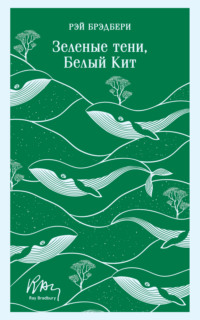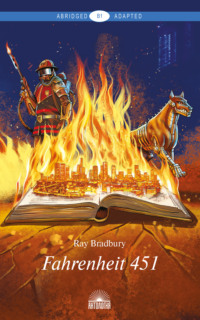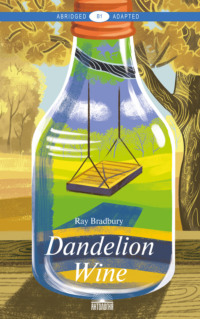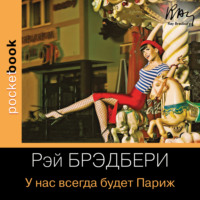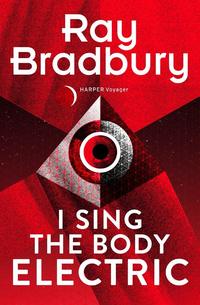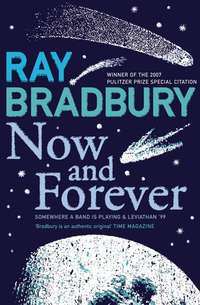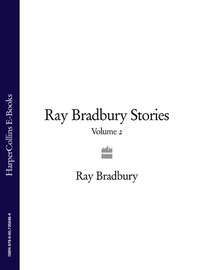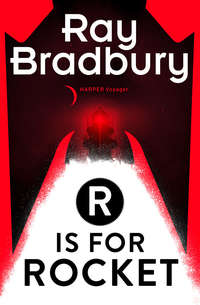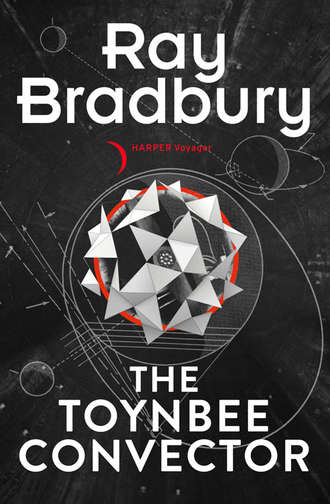
Полная версия
The Toynbee Convector
“I’d like to go walking some spring night-—you know, one of those nights that are warm all night long. I’d like to walk. With a girl. Walk for an hour, to a place where you can barely hear or see anything. Climb a hill and sit. Look at the stars. I’d like to hold the girl’s hand. I’d like to smell the grass and the wheat growing in the fields, and know I was in the center of the entire country, in the very center of the United States, and towns all around and highways away off, but nobody knowing we’re right there on top of that hill, in the grass, watching the night.
“And just holding her hand would be good. Can you understand that? Do you know that holding someone’s hand can be the thing? Such a thing that your hands move while not moving. You can remember a thing like that, rather than any other thing about a night, all your life. Just holding hands can mean more. I believe it. When everything is repeated, and over, and familiar, it’s the first things rather than the last that count.
“So, for a long time,” he had continued, “I’d like to just sit there, not saying a word. There aren’t any words for a night like that. We wouldn’t even look at each other. We’d see the lights of the town far off and know that other people had climbed other hills before us and that there was nothing better in the world. Nothing could be made better; all of the houses and ceremonies and guarantees in the world are nothing compared to a night like this. The cities and the people in the rooms in the houses in those cities at night are one thing; the hills and the open air and the stars and holding hands are something else.
“And then, finally, without speaking, the two of you will turn your heads in the moonlight and look at each other.
“And so you’re on the hill all night long. Is there anything really wrong with this, can you honestly say there is anything wrong?”
“No,” said a voice, “the only thing wrong on a night like that is that there is a world and you must come back to it.”
That was his friend, Joseph, speaking, fifteen years ago. Dear Joseph, with whom he had talked so many days through; their adolescent philosophizings, their problems of great import. Now Joseph was married and swallowed by the black streets of Chicago, and himself taken West by time, and all of their philosophy for nothing.
He remembered the month after he had married Helen. They had driven across country, the first and last time she had consented to the “brutal,” as she called it, journey by automobile. In the moonlit evenings they had gone through the wheat country and the corn country of the Middle West and once, at twilight, looking straight ahead, Thomas had said, “What do you say, would you like to spend the night out?”
“Out?” Helen said.
“Here,” he said, with a great appearance of casualness. He motioned his hand to the side of the road. “Look at all that land, the hills. It’s a warm night. It’d be nice to sleep out.”
“My God!” Helen had cried. “You’re not serious?”
“I just thought.”
“The damn country’s running with snakes and bugs. What a way to spend the night, getting burrs in my stockings, tramping around some farmer’s property.”
“No one would ever know.”
“But I’d know, my dear,” said Helen.
“It was just a suggestion.”
“Dear Tom, you were only joking, weren’t you?”
“Forget I ever said anything,” he said.
They had driven on in the moonlight to a boiling little night motel where moths fluttered about the raw electric lights. There had been an iron bed in a paint-smelling tiny room where you could hear the beer tunes from the roadhouse all night and hear the continental vans pounding by late, late toward dawn.…
He walked through the green forest and listened to the various silences there. Not one silence, but several; the silence that the moss made underfoot, the silence the shadows made depending from the trees, the silence of small streams exploring tiny countries on all sides as he came into a clearing.
He found some wild strawberries and ate them. To hell with the car, he thought. I don’t care if someone takes it apart wheel by wheel, and carries it off. I don’t care if the sun melts it into slag on the spot.
He lay down and cradled his head on his arms and went to sleep.
The first thing he saw when he wakened was his wristwatch. Six forty-five. He had slept most of the day away. Cool shadows had crept up all about him. He shivered and moved to sit up and then did not move again, but lay there with his face upon his arm, looking ahead.
The girl who sat a few yards away from him, with her hands in her lap, smiled.
“I didn’t hear you come up,” he said.
She had been very quiet.
For no reason at all in the world, except a secret reason, Thomas felt his heart pounding silently and swiftly.
She remained silent. He rolled over on his back and closed his eyes.
“Do you live near here?”
She lived not far away.
“Born and raised here?”
She had never been anywhere else.
“It’s a beautiful country,” he said.
A bird flew into a tree.
“Aren’t you afraid?”
He waited but there was no answer.
“You don’t know me,” he said.
But on the other hand, neither did he know her.
“That’s different,” he said.
Why was it different?
“Oh, you know, it just is.”
After what seemed half an hour of waiting, he opened his eyes and looked at her for a long while. “You are real, aren’t you? I’m not dreaming this?”
She wanted to know where he was going.
“Somewhere I don’t want to go.”
Yes, that was what so many people said. So many passed through on their way to somewhere they didn’t like.
“That’s me,” he said. He raised himself slowly. “Do you know, I’ve just realized, I haven’t eaten since early today.”
She offered him the bread and cheese and cookies she was carrying from town. They didn’t speak while he ate, and he ate very slowly, afraid that some motion, some gesture, some word, might make her run away. The sun was down the sky and the air was even fresher now, and he examined everything very carefully.
He looked at her and she was beautiful, twenty-one, fair, healthy, pink cheeked, and self-contained.
The sun was gone. The sky lingered its colors for a time, while they sat in the clearing.
At last he heard a whispering. She was getting up. She put out her hand to take his. He stood beside her and they looked at the woods around them and the distant hills.
They began to walk away from the path and the car, away from the highway and the town. A spring moon rose over the land while they were walking.
The breath of nightfall was rising up out of the separate blades of grass, a warm sighing of air, quiet and endless. They reached the top of the hill and without a word sat there watching the sky. He thought to himself that this was impossible, that such things did not happen; he wondered who she was, and what she was doing here.
Ten miles away, a train whistled in the spring night and went on its way over the dark evening earth, flashing a brief fire.
And then, again, he remembered the old story, the old dream, the thing he and his friend had discussed so many years ago. There must be one night in your life that you will remember forever. There must be one night for everyone. And if you know that the night is coming on and that this night will be that particular night, then take it and don’t question it and don’t talk about it to anyone ever after that. For if you let it pass it might not come again. Many have let it pass, many have seen it go by and have never seen another like it, when all the circumstances of weather, light, moon and time, of night hill and warm grass and train and town and distance were balanced upon the trembling of a finger.
He thought of Helen and he thought of Joseph. Joseph. Did it ever work out for you, Joseph; were you ever at the right place at the right time, and did all go well with you? There was no way of knowing; the brick city had taken Joseph and lost him in the tile subways and black elevateds and noise.
As for Helen, not only had she never known a night like this, but she had never dreamed of such a thing, there was no place in her mind for this.
So here I am, he thought quietly, thousands of miles from everything and everyone.
Across the soft black country now came the sound of a courthouse clock ringing the hour. One. Two. Three. One of those great stone courthouses that stood in the green square of every small American town at the turn of the century, cool stone in the summertime, high in the night sky, with round dial faces glowing in four directions. Five, six. He counted the bronze announcements of the hour, stopping at nine. Nine o’clock on a late spring night on a breathing, warm, moonlit hill in the interior of a great continent, his hand touching another hand, thinking, this year I’ll be thirty-three. But it didn’t come too late and I didn’t let it pass, and this is the night.
Slowly now, carefully, like a statue coming to life, turning and turning still more, he saw her head move about so her eyes could look upon him. He felt his own head turning, also, as it had done so many times in his imagination. They gazed at each other for a long time.
He woke during the night. She was awake, near him.
“Who are you?” he whispered.
She said nothing.
“I could stay another night,” he said.
But he knew that one can never stay another night. One night is the night and only one. After that, the gods turn their backs.
“I could come back in a year or so.”
Her eyes were closed but she was awake.
“But I don’t know who you are,” he said.
“You could come with me,” he said, “to New York.”
But he knew she could never be there or anywhere but here, on this night.
“And I can’t stay here,” he said, knowing that this was the truest and most empty part of all.
He waited for a time and then said again, “Are you real? Are you really real?”
They slept. The moon went down the sky toward morning.
He walked out of the hills and the forest at dawn, to find the car covered with dew. He unlocked it and climbed in behind the wheel, and sat for a moment, looking back at the path he had made in the wet grass. He moved over, preparatory to getting out of the car again. He put his hand on the inside of the door and gazed steadily out.
The forest was empty and still, the path was deserted, the highway was motionless and serene. There was no movement anywhere in a thousand miles.
He started the car motor and let it idle.
The car was pointed east where the orange sun was now rising slowly.
“All right,” he said, quietly. “Everyone, here I come. What a shame you’re all still alive. What a shame the world isn’t just hills and hills and nothing else to drive over but hills and never coming to a town.”
He drove away east without looking back.
West of October
The four cousins, Tom, William, Philip, and John, had come to visit the Family at the end of summer. There was no room in the big old house, so they were stashed out on little cots in the barn, which shortly thereafter burned.
Now the Family was no ordinary family. Each member of it was more extraordinary than the last.
To say that most of them slept days and worked at odd jobs nights, would fall short of commencement.
To remark that some of them could read minds, and some fly with lightnings to land with leaves, would be an understatement.
To add that some could not be seen in mirrors while others could be found in multitudinous shapes, sizes, and textures in the same glass, would merely repeat gossip that veered into truth.
There were uncles, aunts, cousins, and grandparents by the toadstool score and the mushroom dozen.
They were just about every color you could mix in one restless night.
Some were young and others had been around since the Sphinx first sank its stone paws deep in tidal sands.
In all, in numbers, background, inclination, and talent, a most incredible and miraculous mob. And the most incredible of them all was:
Cecy.
Cecy. She was the reason, the real reason, the central reason for any of the Family to come visit, and not only to visit but to circle her and stay. For she was as multitudinous as a pomegranate. Her talent was single but kaleidoscopic. She was all the senses of all the creatures in the world. She was all the motion picture houses and stage play theaters and all the art galleries of time. You could ask almost anything of her and she would gift you with it.
Ask her to yank your soul like an aching tooth and drift it in clouds to cool your spirit, and yanked you were, drawn high to drift in such clouds as sowed rain to grow grass and seed-sprout flowers.
Ask her to seize that same soul and bind it in the flesh of a tree, and you awoke next morning with apples popping out of your branches and birds singing in your green-leafed head.
Ask to live in a frog, and you spent days afloat and nights croaking strange songs.
Ask to be pure rain and you fell on everything. Ask to be the moon and suddenly you looked down and saw your pale illumination bleaching lost towns to the color of tombstones and tuberoses and spectral ghosts.
Cecy. Who extracted your soul and pulled forth your impacted wisdom, and could transfer it to animal, vegetable, or mineral; name your poison.
No wonder the Family came. No wonder they stayed long past lunch, way beyond dinner, far into midnights the week after next!
And here were the four cousins, come to visit.
And along about sunset of the first day, each of them said, in effect: “Well?”
They were lined up by Cecy’s bed in the great house, where she lay for long hours, both night and noon, because her talents were in such demand by both family and friends.
“Well,” said Cecy, her eyes shut, a smile playing about her lovely mouth. “What would your pleasure be?”
“I—” said Tom.
“Maybe—” said William and Philip.
“Could you—” said John.
“Take you on a visit to the local insane asylum,” guessed Cecy, “to peek in people’s very strange heads?”
“Yes!”
“Said and done!” said Cecy. “Go lie on your cots in the barn.” They ran. They lay. “That’s it. Over, up, and—out!” she cried.
Like corks, their souls popped. Like birds, they flew. Like bright unseen needles they shot into various and assorted ears in the asylum just down the hill and across the valley.
“Ah!” they cried in delight at what they found and saw.
While they were gone, the barn burned down.
In all the shouting and confusion, the running for water, the general ramshackle hysteria, everyone forgot what was in the barn or where the high-flying cousins might be going, or what Cecy, asleep, was up to. So deep in her rushing sleep was this favorite daughter, that she heard not the flames, nor the dread moment when the walls fell in and four human-shaped torches self-destroyed. The cousins themselves did not feel the repercussions of their own bodies being snuffed for some few moments. Then a clap of silent thunder banged across country, shook the skies, knocked the wind-blown essences of lost cousin through mill-fans to lodge in trees, while Cecy, with a gasp, sat straight up in bed.
Running to the window, she looked out and gave one shriek that shot the cousins home. All four, at the moment of concussion, had been in various parts of the county asylum, opening trapdoors in wild people’s heads and peeking in at maelstroms of confetti and wondering at the colors of madness, and the dark rainbow hues of nightmare.
All the Family stood by the collapsed barn, stunned. Hearing Cecy’s cry, they turned.
“What happened?” cried John from her mouth.
“Yes, what!” said Philip, moving her lips.
“My God,” gasped William, staring from her eyes.
“The barn burned,” said Tom. “We’re dead!”
The Family, soot-faced in the smoking yard, turned like a traveling minstrel’s funeral and stared up at Cecy in shock.
“Cecy?” asked Mother, wildly. “Is there someone, I mean, with you?”
“Yes, me, Tom!” shouted Tom from her lips.
“And me, John.”
“Philip!”
“William!”
The souls counted off from the young woman’s mouth.
The family waited.
Then, as one, the four young men’s voices asked the final, most dreadful question:
“Didn’t you save just one body?”
The Family sank an inch into the earth, burdened with a reply they could not give.
“But—” Cecy held on to her own elbows, touched her own chin, her mouth, her brow, inside which four live ghosts knocked elbows for room. “But—what’ll I do with them?” Her eyes searched over all those faces below in the yard. “My boy cousins can’t stay here. They simply can’t stand around in my head!”
What she cried after that, or what the cousins babbled, crammed like pebbles under her tongue, or what the Family said, running like burned chickens in the yard, was lost.
Like Judgment Day thunders, the rest of the barn fell.
With a hollow roar the fire went up the kitchen chimney. An October wind leaned this way and that on the roof, listening to all the Family talk in the dining room below.
“It seems to me,” said Father.
“Not seems, but is!” said Cecy, her eyes now blue, now yellow, now hazel, now brown.
“We must farm the young cousins out. Find temporary hospices for them, until such time as we can cull new bodies—”
“The quicker the better,” said a voice from Cecy’s mouth now high, now low, now two gradations between.
“Joseph might be loaned out to Bion, Tom given to Leonard, William to Sam, Philip to—”
All the uncles, so named, snapped their hackles and stirred their boots.
Leonard summed up for all. “Busy. Overworked. Bion with his shop, Sam with his arm.”
“Gah—.” Misery sprang from Cecy’s mouth in four-part harmony.
Father sat down in darkness. “Good grief, there must be some one of us with plenty of time to waste, a small room to let in the backside of their subconscious or the topside of their trapdoor Id! Volunteers! Stand!”
The Family sucked an icy breath, for suddenly Grandma was on her feet, but pointing her witch-broom cane.
“That man right there’s got all the time in the world. I hereby solicit, name, and nominate him!”
As if their heads were on a single string, everyone turned to blink at Grandpa.
Grandpa leaped up as if shot. “No!”
“Hush.” Grandma shut her eyes on the question, folded her arms, purring, over her bosom. “You got all the time in the world.”
“No, by Joshua and Jesus!”
“This,” Grandma pointed around by intuition, eyes closed, “is the Family. No one in the world like us. We’re particular strange-fine. We sleep days, walk nights, fly the winds and airs, wander storms, read minds, hate wine, like blood, do magic, live forever or a thousand years, whichever comes first. In sum, we’re the Family. That being true and particular there’s no one to lean on, turn to, when trouble comes—”
“I won’t—”
“Hush.” One eye as large as the Star of India opened, burned, dimmed down, shut. “You spit mornings, whittle afternoons, and catbox the nights. The four nice cousins can’t stay in Cecy’s upper floor. It’s not proper, four wild young men in a slim girl’s head.” Grandma’s mouth sweetened itself. “Besides, there’s a lot you can teach the cousins. You been around long before Napoleon walked in and then ran out of Russia, or Ben Franklin got the pox. Good if the boys were tucked in your ear for a spell. What’s inside, God knows, but it might, I say might, improve their posture. Would you deny them that?”
“Jumping Jerusalem!” Grandpa leaped to his feet. “I won’t have them all wrestling two falls out of three between my left ear and my right! Kick the sides out of my head. Knock my eyes like basketballs around inside my skull! My brain’s no boardinghouse. One at a time! Tom can pull my eyelids up in the morning. William can help me shove the food in, noons. John can snooze in my cold pork-marrow half-into dusk. Philip can dance in my dusty attic nights. Time to myself is what I ask. And clean up when they leave!”
“Done!” Grandma circled like an orchestra leader, waving at the ghosted air. “One at a time, did you hear, boys?”
“We heard!” cried an anvil chorus from Cecy’s mouth.
“Move ’em in!” said Grandpa.
“Gangway!” said four voices.
And since no one had bothered to say which cousin went first, there was a surge of phantoms on the air, a huge tide-drift of storm and unseen wind.
Four different expressions lit Grandpa’s face. Four different earthquakes shook his brittle frame. Four different smiles ran scales along his piano teeth. Before Grandpa could protest, at four different gaits and speeds, he was run out of the house, across the lawn, and down the abandoned railroad tracks toward town, yelling against and laughing for the wild hours ahead.
The family stood lined up on the porch, staring after the rushing parade of one.
“Cecy! Do something!”
But Cecy, exhausted, was fast asleep in her chair.
That did it.
At noon the next day the big, dull blue, iron engine panted into the railroad station to find the Family lined up on the platform, Grandpa leaned and supported in their midst. They not so much walked but carried him to the day coach, which smelled of fresh varnish and hot plush. Along the way, Grandpa, eyes shut, spoke in a variety of voices that everyone pretended not to hear.
They propped him like an ancient doll in his seat, fastened his straw hat on his head like putting a new roof on an old building, and talked into his face.
“Grandpa, sit up. Grandpa, mind your hat. Grandpa, along the way don’t drink. Grandpa, you in there? Get out of the way, cousins, let the old man speak.”
“I’m here.” Grandpa’s mouth and eyes gave some birdlike twitches. “And suffering for their sins. Their whiskey makes my misery. Damn!”
“No such thing!” “Lies!” “We did nothing!” cried a number of voices from one side, then the other of his mouth. “No!”
“Hush!” Grandma grabbed the old man’s chin and focused his bones with a shake. “West of October is Cranamockett, not a long trip. We got all kinds of folks there, uncles, aunts, cousins, some with and some without children. Your job is to board the cousins out and—”
“Take a load off my mind,” muttered Grandpa, a tear trickling down from one trembling eyelid.
“But if you can’t unload the damn fools,” advised Grandma, “bring ’em back alive!”
“If I live through it.”
“Goodbye!” said four voices from under his tongue.
“Goodbye!” Everyone waved from the platform. “So long, Grandpa, Tom, William, Philip, John!”
“I’m here now, too!” said a young woman’s voice.
Grandpa’s mouth had popped wide.
“Cecy!” cried everyone. “Farewell!”
“Good night nurse!” said Grandpa.
The train chanted away into the hills, west of October.
The train rounded a long curve. Grandpa leaned and creaked his body.
“Well,” whispered Tom, “here we are.”
“Yes.” A long pause. William went on: “Here we are.”
A long silence. The train whistled.
Конец ознакомительного фрагмента.
Текст предоставлен ООО «ЛитРес».
Прочитайте эту книгу целиком, купив полную легальную версию на ЛитРес.
Безопасно оплатить книгу можно банковской картой Visa, MasterCard, Maestro, со счета мобильного телефона, с платежного терминала, в салоне МТС или Связной, через PayPal, WebMoney, Яндекс.Деньги, QIWI Кошелек, бонусными картами или другим удобным Вам способом.


